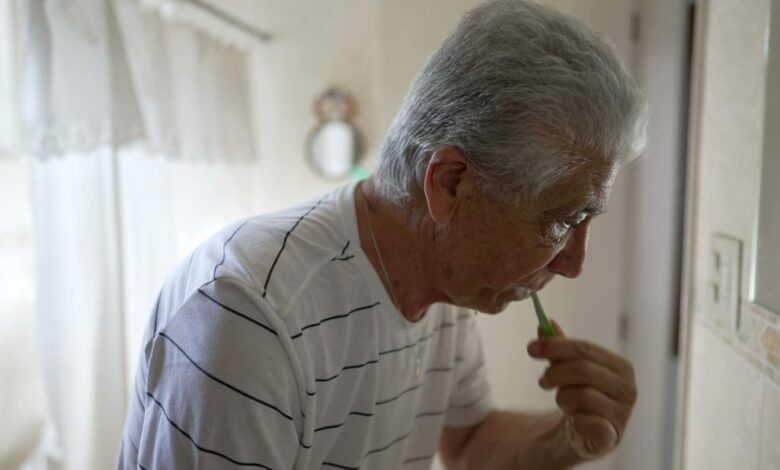Mouth care for people with dementia ‘overlooked’

Researchers have developed checklists to promote mouth and dental care for people at home, after a study revealed that the oral health of people living with dementia is often overlooked by homecare services.
The study, led by the University of Portsmouth in collaboration with King’s College London and Queen Mary University of London, found missed opportunities in delivering oral care and challenges around delivering it for people with dementia.
“Good mouth and teeth care is important for people living with dementia in their own homes”
Dia Soilemezi
The research, published in the International Journal of Geratric Psychiatry, was funded by the National Institute for Health and Care Research’s school for social care research.
It comes as people living with dementia are at risk of mouth and dental problems, as they require more support to maintain personal hygiene, the study noted.
Previous research has found that people living with dementia often have more dental plaque, higher levels of tooth decay and more mouth problems compared to people without dementia.
The aim of the new England-wide study was to explore ways of improving how mouth and dental care is integrated into personal care for people living with dementia at home.
Participants to the research included family carers and homecare workers providing support to people living with dementia at home.
One theme identified from the interviews was that there were often missed opportunities to address oral care, which it said was “not always seen as a priority despite the importance and potential risk of neglect”.
Although oral care is part of many personal care routines, participants acknowledged that they “forget about [it] a lot of the time” and that it was not always possible amid other demands and limited time.
Meanwhile, the research also found challenges in delivering oral care to people living with dementia.
These included factors related to the patient, such as cognitive and physical decline, and factors related to care infrastructure and policies, such as training, allocated time and consistency of care.
The study noted that a patient’s challenging or distressed behaviour and changeable mood, in combination with “the invasive nature of oral health”, could risk poor oral hygiene.
Participants argued that education and training were key to improving the confidence of carers and homecare workers in delivering oral care.
They said that brushing someone’s teeth “requires specific skills and some sensitivity” and noted that not all care workers were trained to do it properly.
The participants in the study were asked about the support available from dental and other health services in relation to oral care but had “mixed views”.
Community nurses and Dementia UK’s specialist Admiral Nurses were perceived as helpful by some staff and carers.
Despite this, some homecare managers described a general lack of support and feeling “disconnected” from NHS services.
The study concluded that oral care “could be more consistently addressed and more integrated in assessment and care planning”.
It suggested that other professionals should encourage homecare providers and carers to “think strategically and practically about oral health care” and its place in overall planning as disabilities develop.
Dr Dia Soilemezi, project lead from the University of Portsmouth’s Department of Psychology, said: “Good mouth and teeth care is important for people living with dementia in their own homes because they are at higher risk of dental problems and may find it difficult to report pain or discomfort.
“Poor oral health not only influences physical health but also impacts on self-esteem, dignity, nutrition and quality of life, so it needs to be taken seriously.”
The research team behind the study has co-developed free checklists to promote mouth and dental care for local authority social workers and homecare providers.
These were developed with people using homecare services and homecare providers as well as experts in dementia and dental care.
“Practitioners could utilise these resources as reminders to put assessments in place for oral hygiene and draw on the recommendations for care practices,” explained Dr Soilemezi.
“In contrast to care homes, few people working in homecare receive support and training about mouth and dental care despite its importance to people living with dementia.
“We hope the material we’ve produced will go some way to bridge the training gap.”







